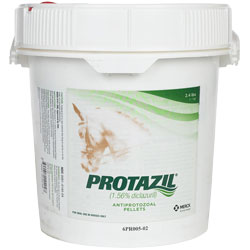Protazil (1.56% diclazuril) Antiprotozoal Pellets for Horses
The first pelleted treatment for EPM
Veterinarian Prescription (Rx) RequiredFree Shipping
Low Price Match Guarantee
- First FDA-approved alfalfa-based, pelleted treatment for equine protozoal myeloencephalitis (EPM)
- 2.4 lb bucket
- 28-day supply
*Manufacturer restricts additional discounts on this item unless explicitly specified.
Description
PROTAZIL (1.56% diclazuril) Antiprotozoal Pellets, an alfalfa-based top-dress pellet, are indicated for the treatment of equine protozoal myeloencephalitis (EPM) in horses.
- Safe, easy and effective, PROTAZIL® (1.56% diclazuril) Antiprotozoal Pellets start working fast against a disease where time matters
- First FDA-approved alfalfa-based, pelleted formulation containing diclazuril
- Rapid absorption and no loading dose required
- Makes accurate dosing and administration easier and safer for horse owners
- Well-accepted by horses and consumed with no mess or fuss
- Administer as a daily top-dress at 1 mg/kg for 28 days
Dosage Amount
- Each 100 grams of pellets contain 1.56 grams diclazuril.
- Administer 1 milligram per kilogram (0.45 milligrams per pound) of horse's body weight in the daily grain ration for 28 days.
For the treatment of equine protozoal myeloencephalitis (EPM) caused by Sarcocystis neurona. Limitations Do not use in horses intended for human consumption. Federal law restricts this drug to use by or on the order of a licensed veterinarian.
There is no way to prevent EPM as no vaccine exists. The best way to reduce the risk of your horse contracting the disease is to minimize exposure to opossum feces. Risk factors include
- All age groups may be affected, however, EPM is more common in horses 1 - 7 years of age
- Presence of opossums
- Previously infected horses on premises
- Summer and fall seasons (winter has fewer cases)
- Stress - including shipping or recent illness
- Wooded terrain near pastures
- Feed and hay accessible to opossums
Important Safety Information:
| RX required for this item. Click here for our full Prescription Policy and Form |
FREE SHIPPING!
Protazil is a 2lb, 28-DAY SUPPLY ALFALFA BASE PELLET TO BE FED DAILY FOR THE TREATMENT OF EPM (EQUINE PROTOZOAL MYELOENCEPHALITIS).
- First FDA-approved alfalfa-based, pelleted formulation containing diclazuril
- Makes accurate dosing and administration easier and safer for horse owners
- Indicated for the treatment of EPM caused by S. neurona in horses
- Administer as a daily top-dress at 1.0 mg/kg for 28 days
- Available in 2-pound containers. Dose is measured with a calibrated scoop
Ingredients: Diclazuril
Dosage Amount
- Each 100 grams of pellets contain 1.56 grams diclazuril.
- Administer 1 milligram per kilogram (0.45 milligrams per pound) of horse's body weight in the daily grain ration for 28 days.
For the treatment of equine protozoal myeloencephalitis (EPM) caused by Sarcocystis neurona. Limitations Do not use in horses intended for human consumption. Federal law restricts this drug to use by or on the order of a licensed veterinarian.
There is no way to prevent EPM as no vaccine exists. The best way to reduce the risk of your horse contracting the disease is to minimize exposure to opossum feces. Risk factors include:
- All age groups may be affected, however, EPM is more common in horses 1 - 7 years of age
- Presence of opossums
- Previously infected horses on premises
- Summer and fall seasons (winter has fewer cases)
- Stress - including shipping or recent illness
- Wooded terrain near pastures
- Feed and hay accessible to opossums






